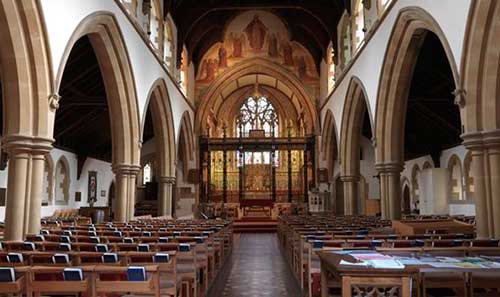
A ‘perfect storm’ results from a combination of adverse factors. I keep tripping over such factors:
I read of the relentless decline of The US Episcopal Church continuing. It is regularly contrasted with a (yet-to-be-verified-and-I-suspect-oversimplified) meme that “conservative churches are growing” (in fact cathedral worship is bucking the trend).
The fragmenting tendency of Bible-alone protestantism is importantly highlighted by Ken Howard in his paper Singularity: The Death of Religion and the Resurrection of Faith. In that study, he demonstrates that protestant Christianity is now fragmenting at a faster rate than the growth of the number of Christians. The fragmentation has accelerated in the past half century to possibly already being at the point of no return. He tries to put a positive spin on the sobering read in the conclusion:
With denominations and churches splitting at an ever-increasing rate, and as a result growing smaller and smaller, we may end up with a Church that looks more like it did in its first century state than at any time since: more diverse and less hierarchical, more faith than religion, more a movement than an institution.
NZ Anglicanism keeps no church-wide statistics. We have no idea of numbers in church. We have no idea of age or training of our leadership. We have no strategic planning of, for example, the suggested population base for planting new parishes. Reactions to rapidly-changing population movements and new housing areas are done ad hoc.
And how are we using our inherited financial treasures and properties? And as our numbers decrease, what reflection is there on the ratio between paid and unpaid members of the church? And ratios between property and church numbers? And why are we making the decisions we are making?
Other factors:
- growing secularisation
- presumption of science/faith conflict, and many Christians reinforcing of that
- growing individualism
- more choice in the options for leisure time
- Christians putting emphasis where most no longer have a focus
- disagreement and discord
- …
I recently mentioned that I’ve been watching recordings of The New Zealand Home. When the programme came to recounting the 1990s, they described the leaky homes crisis. New Zealand abandoned training of builders and those associated with building trades, and prescriptive building standards were also removed. The result was a decade-long disaster that we are still suffering the effects of. The repairs and replacement costs that may have been avoided were estimated in 2009 to be approximately $11.3 billion. The problem extends beyond homes to other buildings also. The human suffering is incalculable.

Clad in safety suits and masks, Crosson and Paladin stood stunned in a disaster of a property that the owners had been forced to abandon.
“We walked in and what you see just blows you away,” says Paladin. “I think it was three or four months after that family had evacuated, and we literally saw mushrooms growing in the carpet. It was revolting.”
Crosson calls it, “A perfect storm of things going wrong”.
As previously, I could not get out of my mind that I was watching a parable of NZ Anglicanism. We cannot agree on a standard for leadership training and formation. And we have systematically removed nearly all prescriptive standards from the very core of our church life – common prayer.
Are we heading into a perfect storm?
If you appreciated this post, do remember to like the liturgy facebook page, use the RSS feed, and sign up for a not-very-often email, …



Might I recommend Rev. Ferguson’s response to the decline of The Episcopal Church (and other mainline/oldline churches). http://crustyoldean.blogspot.com/2016/09/its-end-of-church-as-we-know-it.html
Thanks, Thomas. That’s a very helpful complement to what I’ve written on this site. Blessings.
Here’s a point I think worth considering — for most of human history day-to-day survival (food, shelter, etc.) meant being interdependent among one’s group (village, tribe, collective, etc.). One hypothesis could be that we therefore ended up being hard-wired physiologically (via the evolutionary process) to be socially connected to those in our proximity. It’s possible that through a combination of (historically) recent events –the agricultural revolution, the industrial revolution, the technology age– we don’t actually “need” to have close alliances with our family, friends, and neighbors simply in order to survive.
And so in the 21st Century all we are left with is our inherited biological drive to form these connections. Research in the US shows that adults have smaller friendship networks and are also living in smaller family units. But there’s no research that shows they are unhappier.
The question then becomes, what is the minimum number of social connections necessary for survival and happiness for an adult human in the developed world? I suspect we haven’t reached that number yet.
And this could spell either doom or hope for the church as an institution. It’s possible the minimal inherent desire for sociability will sustain small church congregations. Or equally possible that we can use technology and other means to meet our affinity needs and churches become anachronisms.
As for God, she will keep marching on with the faithful.
Yes, Jonathan, I think this is also part of the discussion, and it connects with the importance of having spirituality present on the internet. Blessings.
May I recommend Ratzinger’s Faith and the Future. Particularly, the essay, ‘The Church will become small’.
Thanks, Paul. Blessings.